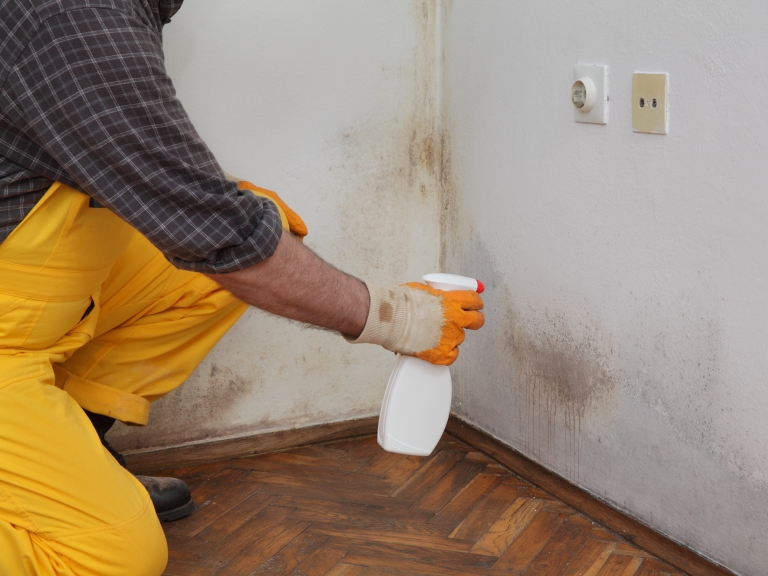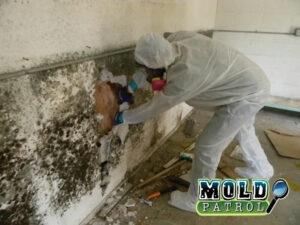In this article, we will discuss the importance of mold removal in ensuring a mold-free living environment in Greensboro. You will learn about the risks associated with mold growth, how to identify mold in your home, and the steps you can take to effectively remove it. By the end, you’ll have a better understanding of the importance of addressing mold issues promptly and how it can contribute to a healthier and safer living space for you and your loved ones.

What is mold?
Definition of mold
Mold is a type of fungus that grows in damp, warm, and humid conditions. It reproduces by releasing spores into the air, which can easily spread and settle on surfaces, causing mold growth. Mold can be found indoors and outdoors and is commonly associated with areas that have high moisture levels, such as bathrooms, basements, and crawl spaces.
Common types of mold
There are many different types of mold, but some of the most common ones include:
-
Cladosporium: This mold can be found both indoors and outdoors and is often found on plants, wood, and textiles. It is known to cause hay fever-like symptoms and can aggravate asthma.
-
Aspergillus: This mold can be found in damp areas such as bathrooms and kitchens. It can produce mycotoxins that can cause respiratory problems and allergies.
-
Penicillium: This mold is often found in water-damaged buildings and can cause allergic reactions and respiratory problems. It is also known to produce mycotoxins that can be harmful to humans.
-
Alternaria: This mold is commonly found in soil and plants and can enter buildings through doors, windows, and air conditioning systems. It can cause allergic reactions and asthma symptoms.
Health risks of mold exposure
Exposure to mold can have various health risks, especially for individuals with respiratory conditions or compromised immune systems. Some of the health risks associated with mold exposure include:
Respiratory problems
Mold spores can trigger respiratory problems, such as coughing, wheezing, and shortness of breath. Individuals with asthma or allergies may experience more severe symptoms when exposed to mold.
Allergies and sensitivities
Mold can cause allergic reactions, such as sneezing, runny nose, and itchy eyes. Some people may also develop mold sensitivity, where they experience symptoms when exposed to even small amounts of mold.
Skin irritation
Direct contact with mold can cause skin irritation, redness, and rashes. This is especially true for individuals with sensitive skin.
Headaches and fatigue
Exposure to mold can lead to frequent headaches and chronic fatigue. These symptoms can significantly impact one’s quality of life and productivity.
Potential long-term health effects
Prolonged exposure to mold can potentially lead to more serious health effects, including respiratory infections, fungal infections, and long-term lung damage. It is crucial to address any mold issues promptly to minimize these risks.
Understanding the importance of mold removal
Preventive measures
Taking preventive measures is essential to prevent mold growth in your home. Ensure proper ventilation in high-moisture areas, use dehumidifiers to control humidity levels, fix any water leaks immediately, and regularly clean and dry areas prone to moisture.
Mold growth and spread
If left unaddressed, mold can quickly grow and spread throughout your home. Mold spores can travel through the air and settle on different surfaces, leading to further mold infestations.
Property damage
Mold can cause significant damage to your property. It can deteriorate building materials, weaken structures, and stain surfaces. Mold growth can also lead to unpleasant odors and decrease the value of your property.
Significance of professional mold removal
While some mold issues can be tackled with DIY techniques, it is often advisable to seek professional mold removal services. Professional mold remediation companies have the knowledge, expertise, and specialized equipment to effectively identify and eliminate mold infestations.
Identifying mold infestation
Visible signs
One of the most obvious signs of mold infestation is visible mold growth. Look out for black, green, or white patches on walls, ceilings, floors, or other surfaces. Mold can also grow on fabrics, furniture, and other porous materials.
Musty odor
If you notice a musty or earthy odor in certain areas of your home, it could indicate the presence of hidden mold. Mold has a distinct smell that can be difficult to ignore.
Hidden mold
Sometimes mold can grow in hidden or hard-to-reach areas, such as behind walls, under carpets, or inside ductwork. If you suspect mold but cannot locate the source, it is important to seek professional assistance to identify and remediate the problem.

DIY mold removal techniques
In some cases, minor mold issues can be addressed using DIY techniques. However, it is crucial to take proper safety precautions and consult with professionals if the mold infestation is extensive or if you have health concerns. Here are some common methods for DIY mold removal:
Safety precautions
Before starting any mold removal process, ensure that you have protective gear, including gloves, goggles, and a mask. It is important to minimize your exposure to mold spores and prevent them from spreading to other areas of your home.
Using vinegar or hydrogen peroxide
Vinegar or hydrogen peroxide can be effective in killing and removing mold on non-porous surfaces. These natural solutions have antimicrobial properties that can help eliminate mold spores and prevent regrowth.
Bleach as a last resort
Bleach is often used for mold removal, but it should be a last resort. While bleach can kill mold on hard surfaces, it may not effectively eliminate mold on porous materials. Additionally, bleach can emit harmful fumes and damage certain surfaces.
Cleaning and disinfecting affected areas
Thoroughly clean and disinfect the affected areas using a mild detergent or a mold-specific cleaner. Scrub the surfaces with a brush or sponge and ensure they are completely dry to prevent mold regrowth.
Preventing future mold growth
After removing mold, it is essential to address the underlying issues that led to its growth. Fix any water leaks, improve ventilation, and maintain proper humidity levels to prevent future mold infestations.
When to seek professional mold removal services
While DIY techniques may be suitable for minor mold issues, there are certain situations where professional mold removal services are recommended. Consider seeking professional help in the following situations:
Extensive mold infestation
If the mold infestation covers a large area or extends beyond the surface, it is advisable to call professionals. They have the expertise and equipment to effectively identify and remediate extensive mold growth.
Health concerns
If you or your family members have experienced severe allergic reactions, respiratory problems, or other health issues due to mold exposure, it is crucial to seek professional assistance. They can assess the situation and take necessary steps to ensure a mold-free environment.
Complex or hard-to-reach areas
Mold can grow in complex or hard-to-reach areas, such as crawl spaces or inside walls. Professional mold removal companies have the knowledge and equipment to access these areas and effectively eliminate mold.
Risk of further damage
If mold growth has caused significant damage to your property, such as compromised structures or extensive water damage, it is important to involve professionals. They can not only remove the mold but also address the underlying issues and prevent further damage.

Benefits of professional mold removal
Thorough inspection and assessment
Professional mold remediation companies conduct a thorough inspection to identify the extent of the mold infestation and assess any underlying issues. This enables them to develop an effective remediation plan tailored to your specific situation.
Safe and efficient mold remediation
Professionals have the necessary training and equipment to safely remove mold and prevent its spread. They use specialized techniques to contain and eliminate mold growth without causing additional damage to your property or endangering your health.
Preventing mold recurrence
One of the main advantages of hiring professionals is their ability to prevent mold recurrence. They address the root causes of mold growth, such as water leaks or high humidity, to ensure that the mold does not return after remediation.
Expertise and specialized equipment
Professional mold remediation companies have the knowledge and experience to handle mold-related issues effectively. They use specialized equipment, such as air purifiers and dehumidifiers, to ensure thorough mold removal and improve indoor air quality.
Choosing the right mold removal company
When selecting a mold removal company, it is important to consider the following factors:
License and certification
Ensure that the company is licensed and certified to perform mold remediation services. This ensures that they have met the necessary industry standards and regulations.
Experience and reputation
Look for a company with extensive experience in mold removal. Check their track record and read customer reviews to gauge their reputation and reliability.
Insurance coverage
Verify that the company has appropriate insurance coverage, including general liability and workers’ compensation insurance. This protects you from any potential liabilities in case of accidents or damages during the remediation process.
Customer testimonials
Consider reading customer testimonials or requesting references from previous clients. This will give you an insight into the quality of service and customer satisfaction provided by the mold removal company.
Cost and guarantees
Obtain multiple quotes from different mold removal companies and compare their pricing. However, prioritize the quality of service over price alone. Additionally, inquire about any guarantees or warranties provided by the company for their work.

Preventing future mold growth
Taking proactive steps to prevent future mold growth is essential for maintaining a mold-free living environment. Here are some preventive measures you can implement:
Managing humidity levels
Keep humidity levels in your home between 30% and 50%. Use dehumidifiers in high-moisture areas such as bathrooms and basements to control humidity levels.
Proper ventilation
Ensure proper ventilation in your home by using exhaust fans in bathrooms, kitchens, and laundry rooms. Open windows and doors periodically to allow for air circulation.
Addressing water leaks and moisture issues
Fix any water leaks immediately and address any moisture issues promptly. Repairing leaks, improving insulation, and using waterproofing materials can help prevent water intrusion and subsequent mold growth.
Regular maintenance and inspections
Perform regular maintenance inspections to identify and address any issues that may lead to mold growth. Clean and dry areas prone to moisture, regularly inspect plumbing and HVAC systems, and ensure proper maintenance of your property.
Conclusion
Living in a mold-free environment is essential for your health and well-being. Mold can cause various health problems and property damage if left unaddressed. By understanding the importance of mold removal, identifying mold infestations, implementing preventive measures, and seeking professional assistance when necessary, you can ensure a mold-free living environment. By taking proactive steps and investing in professional mold removal services, you can create a safe and healthy living space for yourself and your loved ones. Remember, prevention and prompt action are key to maintaining a mold-free home.
